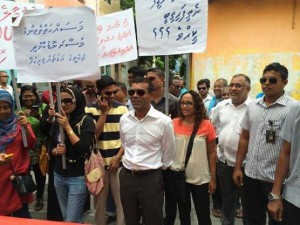Ruling Progressive Party of Maldives (PPM) MP Abdulla Maseeh Mohamed and opposition Maldivian Democratic Party (MDP) MP ‘Reeko’ Moosa Manik have been elected speaker and deputy speaker of the 18th People’s Majlis, respectively.
Fuvamulah South MP Maseeh was elected with a simple majority of 43 votes while Jumhooree Party (JP) Leader Gasim Ibrahim received 39 votes.
Hulhuhenveiru MP Moosa Manik was elected with 42 votes while PPM contender Abdul Raheem Abdulla received 41 votes.
Voting took place through secret ballot at the first sitting of the new parliament following a swearing-in ceremony in the morning, where the oath of office for the 85 MPs-elect was administered by Chief Justice Ahmed Faiz Hussain.
The ballots were counted by a five-member committee chosen at the beginning of the sitting with unanimous consent of all MPs present.
In the vote to elect the speaker, two ballots were invalidated as they were not marked with the designated pen. One ballot was not counted in the vote to elect the deputy speaker as the MP had voted for both candidates.
JP MP Mohamed Hussain who chaired today’s sitting did not participate in the vote. The veteran MP presided over the first sitting in accordance with Article 82 of the constitution, which states, “Until such time as a speaker and a deputy Speaker is elected the People’s Majlis shall be presided over by the consecutively longest serving member from among those present.”
Coalition on the rocks
The ruling Progressive Coalition meanwhile appeared on the brink of collapse yesterday as the dispute over the speaker’s post saw the PPM threaten to sever its coalition agreement with the JP if Gasim Ibrahim did not withdraw his candidacy.
The business tycoon, however, refused and accused the PPM of breaching the coalition agreement by not providing 35 percent of political posts and failing to include the JP in decision-making.
After Gasim’s name was nominated at today’s sitting, Tourism Minister Ahmed Adeeb told local media before the vote was taken that the JP was no longer part of the coalition.
The PPM deputy leader revealed that the decision was made last night by the ruling party’s council, adding that the council would ask President Abdulla Yameen to dismiss political appointees belonging to the JP.
The parties entered a formal coalition agreement ahead of last year’s presidential election run-off between former President Mohamed Nasheed and PPM candidate Abdulla Yameen after Gasim placed third.
Gasim’s endorsement of Yameen proved to be crucial in the PPM-led coalition’s narrow victory in the second round of November’s presidential polls.
After a joint campaign for the parliamentary polls in March, the Progressive Coalition secured 53 out of 85 seats. The PPM won 33 seats, followed by the MDP with 26 seats, JP with 15 seats, MDA with five seats, independent candidates with five seats and the Adhaalath Party with one seat.
Neither party won enough seats to reach the 43-vote simple majority.
Shortly after the polls, three out of the five independent candidates as well as MDP MP-elect Mohamed Musthafa signed for the ruling party, bringing the PPM’s numbers to 37 MPs.
MDP
The opposition MDP had decided to support Gasim after announcing eight conditions for supporting a candidate.
 Former President Mohamed Nasheed – acting president of the main opposition party – meanwhile led a small group of MDP protesters outside the parliament house, calling on the government to fulfil campaign pledges.
Former President Mohamed Nasheed – acting president of the main opposition party – meanwhile led a small group of MDP protesters outside the parliament house, calling on the government to fulfil campaign pledges.
Speaking to reporters, Nasheed accused President Abdulla Yameen and PPM Leader Maumoon Abdul Gayoom of attempting to control all powers of the state.
Contending that the PPM had no intention of honouring its coalition agreement with the JP, Nasheed said that the current administration was “based on a lie.”
“So I am hoping that the government will soon be changed. I don’t see how the government can be sustained with 25 percent support,” he said.